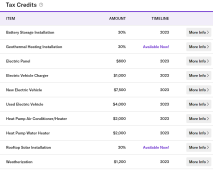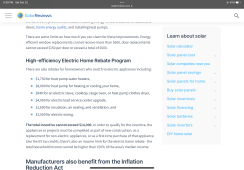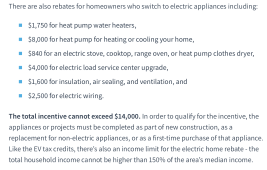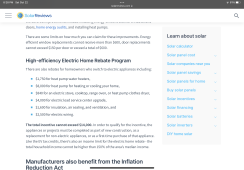I am waiting for the new 120 volt models to ship. And I'll get one.I put in an AO Smith 40 gal last year to replace an electric heater that was in the house when I bought it in '94, and I suspect it was the original to the house when it was built in '70. Don't make them like that anymore.
I knew there were high failure rates on hybrid heaters when I bought it, but took a chance. So far, so good (jinx....) I keep mine on heat pump only mode all of the time and it provides all the hot water I need. Someone mentioned that the space it's in gets cooled. Sure does. I have mine in the basement and you can feel the coolness. However, it's also a dehumidifier, so it takes a significant amount of moisture out of the air, lessening the load on my standalone dehumidifier. My basement has never been drier or more comfortable.
You are using an out of date browser. It may not display this or other websites correctly.
You should upgrade or use an alternative browser.
You should upgrade or use an alternative browser.
Aosmith hybrid water heaters wasted $
- Thread starter Swheeler
- Start date
Well... that comment was just to point out the report wasn't for Rheem...Good to know that you like Rheem.
My current H20 heater is going on 17 years old and a recent draining of ~5g produced an impressive amount of scale and black flakes. I fear the inner liner is now compromised. Previous dranings only produced small amount of scale.
I've had more gas valve failures on Rheem water heaters lately.
OzSolar
Whatever you did, that's what you planned.
Well there's that. Thanks for your input. I'm going to table this discussion at my house for now, keep my $1600 and not worry about it until my existing straight resistance unit fails. I'm already net positive in the summer and I wouldn't run it in the winter since it lives my basement and it's already cold enough down there.Well... that comment was just to point out the report wasn't for Rheem...
I've had more gas valve failures on Rheem water heaters lately.
Brett V
Mad Scientist
My GE Geospring has been trouble free for almost 9 years now. The original reason for getting it was so I could get hot water when running the generator. At that time, I wasn't too concerned about electricity costs and solar was the farthest thing from my mind. To sweeten the deal, I got a tax credit on the price of the water heater, my local electricity supplier offered a nice rebate for purchasing, and I sold my old water heater on Craigslist for $150
Hedges
I See Electromagnetic Fields!
- Joined
- Mar 28, 2020
- Messages
- 21,532
I've had more gas valve failures on Rheem water heaters lately.
Older models, many parts are interchangeable.
I had picked up a spare water heater at ReStore, then stored it for years outside.
When I installed it as a replacement, gas valve was malfunctioning. So I swapped for the old one, and it is working fine.
Easy replacements. That won't be the case with newfangled contraptions.
If something is wrong with newer model gas valves, is there a brand/source of quality replacements?
I am accustomed to gas appliances operating flawlessly for decades.
Only things like forced air exhaust and airflow sensors give me trouble. Passive convection venting, less to go wrong.
I plan to put in a Rheem 65 gallon HPWH in January. With the passage of the Inflation Reduction Act, you can get up to a $1750 tax credit as compared to a $300 credit for this year. Yes, there are complaints about noise but I’m willing to take the chance for a unit that will basically be free with the tax credit. My current unit is 25 years old and the single biggest daily user of electricity in my house aside from the EV. we are trying to reduce our electricity consumption as much as possible before putting in a solar system. The HPWH seems like a logical choice
Ampster
Renewable Energy Hobbyist
Thanks for clarifying the credit. I am fortunate that in the past and in my current situation I can put them in the garage. I almost went for one this year but the increased credit makes it a no brainer for early next year.With the passage of the Inflation Reduction Act, you can get up to a $1750 tax credit as compared to a $300 credit for this year. Yes, there are complaints about noise but I’m willing to take the chance
Hedges
I See Electromagnetic Fields!
- Joined
- Mar 28, 2020
- Messages
- 21,532
I plan to put in a Rheem 65 gallon HPWH in January. With the passage of the Inflation Reduction Act, you can get up to a $1750 tax credit as compared to a $300 credit for this year.
Federal?
I find mention of $3800 from CPUC, but haven't found documents yet.
It does say you have to hand over the keys:

California injects $40M into heat pump water heater effort amid broader push to decarbonize buildings
Regulators nearly doubled the funding authorized for heat pump water heaters as part of an initiative in the state's self-generation incentive program.
Hedges
I See Electromagnetic Fields!
- Joined
- Mar 28, 2020
- Messages
- 21,532
The Inflation Enhancement Act only offers that $1750 to "lower and moderate income" taxpayers.
i.e., I don't get the benefit, rather I pay for it.

 www.philbarnettplumbing.com
www.philbarnettplumbing.com
i.e., I don't get the benefit, rather I pay for it.

Inflation Reduction Act Will Lower Your Cost for a Hybrid Water Heater
New federal law provides rebates and tax incentives for energy-efficient heat pump water heaters No matter what's going on around me lately, my mind keeps coming back to how can I spend less money, save more money, or continue running my household and business on
 www.philbarnettplumbing.com
www.philbarnettplumbing.com

Heat Pump Water Heater Federal Tax Credits: A Guide for Homeowners
In this guide, we’ll explain all the tax credits and rebates you can get when you install a heat pump water heater. We’ll also break down eligibility requirements.
OzSolar
Whatever you did, that's what you planned.
Fascinating. Thanks folks.
This was the first time I'd heard of the invectives other than the straight 30% for 2023 but research seems to support that. The below link will take you a calculator where you can plug in your income.

 www.rewiringamerica.org
www.rewiringamerica.org

This was the first time I'd heard of the invectives other than the straight 30% for 2023 but research seems to support that. The below link will take you a calculator where you can plug in your income.

Household electrification incentives calculator from Rewiring America
Find out how much you could save with tax credits and rebates for heat pumps, water heaters, electric vehicles, electric stoves, rooftop solar, wiring upgrades, and energy efficiency improvements to your home.

So the $1750 for a hw heater is for all income levels, everybody gets it regardless of income level?There is mention of up to $2000 that would be income dependent in other articles I reviewed. The above implies to me at least that the $1750 is for all income levels.
Last edited:
I wonder which would be cheaper to run, our current gas water heater or the heat pump water heater. I'm guessing the gas one is still better, despite the jacked up natural gas prices as of late. And the gas water heater is stupid simple.
Going back to the OP, what is supplying the hybrid hot water heater? Is it an inverter off a solar + battery system? Dirty power of a
Cheap inverter will trash some equipment, I don’t care if it says “pure sine wave”.
At a certain number of failures you can’t point at the Water heater as the issue, I’d be looking at the installation and what’s supplying the heater.
Cheap inverter will trash some equipment, I don’t care if it says “pure sine wave”.
At a certain number of failures you can’t point at the Water heater as the issue, I’d be looking at the installation and what’s supplying the heater.
Rider
Solar Addict
At the time I installed mine, a credit was available, but ONLY if installed by a specific, certified installer. DIY and regular plumbers were excluded. I did not get any credits.
soylentgreen
New Member
- Joined
- Apr 23, 2021
- Messages
- 93
When i installed my heat pump hot water heater about 4 years ago, I was upgrading from a natural gas heater. My utility had rebates, but only when upgrading from an electric heater, not from a gas one. That seems like "old thinking" to me - I wonder if more recent state or federal rules allow the gas->electric (heat pump) conversion now?
Last edited:
Hedges
I See Electromagnetic Fields!
- Joined
- Mar 28, 2020
- Messages
- 21,532
San Jose California Household Income | Department of Numbers
The median household income for San Jose California was $139,892 in 2021. 2022 median household income data for San Jose-Sunnyvale-Santa Clara, CA will be released in September 2023.
"
Real Median Household Income for San Jose California
| 2021 | 1 Year Change | 3 Year Change | |
|---|---|---|---|
| US | $69,717 | -1.64% | +4.32% |
| California | $84,907 | -1.88% | +4.54% |
| San Jose | $139,892 | -1.28% | +3.98% |
Damn, I don't qualify ?
(I don't expect you to cry for me.)
I wonder which would be cheaper to run, our current gas water heater or the heat pump water heater. I'm guessing the gas one is still better, despite the jacked up natural gas prices as of late. And the gas water heater is stupid simple.
I think so. My present rates indicated gas was 8 to 15 times cheaper than electric, so even if HPWH is 300% efficient there's still a huge gap.
But if the 3x or so spike in prices this month holds, the gap was just closed:
Perfect Storm Fuels Massive Natural Gas Price Spikes On West Coast | ZeroHedge
ZeroHedge - On a long enough timeline, the survival rate for everyone drops to zero
At the time I installed mine, a credit was available, but ONLY if installed by a specific, certified installer. DIY and regular plumbers were excluded. I did not get any credits.
Under the present administration, probably only if manufactured in a unionized factory and installed by "prevailing wage" employees.
The fact DIY has lower costs, often under rebate amount, ought to be good enough for them. Certainly if percentage credit that holds true. These credits are particularly appealing if they cover 100% of equipment cost.
If an equipment investment provides a clear $$ savings, at least some consumers don't need rebates to adopt it. Changing gas to electric when that increases energy costs, they're trying to get us to shoot ourselves in the foot. Seems like if HPWH with rebate is enough cheaper than resistance heater to make up for the possibly shorter lifespan, could be a good deal. If energy cost is 3x to 5x natural gas, you couldn't pay me to switch.
Attachments
My old house had a basic 40 gallon electric water heater and it really didn't seem all that expensive to run. It was only just me living in it at the time as well so I'm sure that helped keep the usage fairly low. But still, my electric bills weren't terrible at all, and everything else was electric in the house except for the fuel oil furnace, which I later replaced with a heat pump with propane secondary. Side note on the heat pump - it would keep the house at 70 degrees when it was only about 20 degrees outside, but it would run almost non-stop at that point and would start really driving the electric usage up. At the time, I found switching to propane at about 35 degrees was more cost effective with the 95% efficient furnace. Some years I'd change the auto switchover temperature depending on the price of propane that year (electric was pretty stable).
My current house is a 40 gallon natural gas tank and a 80% efficient natural gas furnace, with a low SEER central AC that barely can keep up when it gets really hot. I really want to upgrade it all, but the cost outlay up front is just too much to chew. Equipment costs are way higher than they were for the same basic stuff that I got a decade ago at the old place.
My current house is a 40 gallon natural gas tank and a 80% efficient natural gas furnace, with a low SEER central AC that barely can keep up when it gets really hot. I really want to upgrade it all, but the cost outlay up front is just too much to chew. Equipment costs are way higher than they were for the same basic stuff that I got a decade ago at the old place.
Hedges
I See Electromagnetic Fields!
- Joined
- Mar 28, 2020
- Messages
- 21,532
One possibility is that your AC is tired. One of my freezers needed a recharge, has been fine since.
Another is excessive heat loss/gain. You know that of course, but given recent equipment and energy costs, attacking that may be more cost effective than before. I'm thinking the same about another house (no AC needed, but heating is.) For my present place, uninsulated vaulted ceiling is the worst source of heat gain. Portions with a ceiling, attic vent has provided a benefit.
Another is excessive heat loss/gain. You know that of course, but given recent equipment and energy costs, attacking that may be more cost effective than before. I'm thinking the same about another house (no AC needed, but heating is.) For my present place, uninsulated vaulted ceiling is the worst source of heat gain. Portions with a ceiling, attic vent has provided a benefit.
One possibility is that your AC is tired. One of my freezers needed a recharge, has been fine since.
Another is excessive heat loss/gain. You know that of course, but given recent equipment and energy costs, attacking that may be more cost effective than before. I'm thinking the same about another house (no AC needed, but heating is.) For my present place, uninsulated vaulted ceiling is the worst source of heat gain. Portions with a ceiling, attic vent has provided a benefit.
Not tired, it blows cold and isn't very old, but the thing is just barely enough for the house size, and the duct layout of the house is terrible so overall airflow sucks. Plus as you mentioned the insulation in the house isn't great. Improving the duct layout and insulation in the attic are my two much higher priorities before the actual unit itself. I'm limited to how much I can fix the crappy ductwork due to being a 2 story house, but I think I can do something. Too many other projects first...
Sorry for the hijack.
Similar threads
- Replies
- 96
- Views
- 4K
- Replies
- 4
- Views
- 535
- Replies
- 30
- Views
- 17K
- Replies
- 8
- Views
- 386





